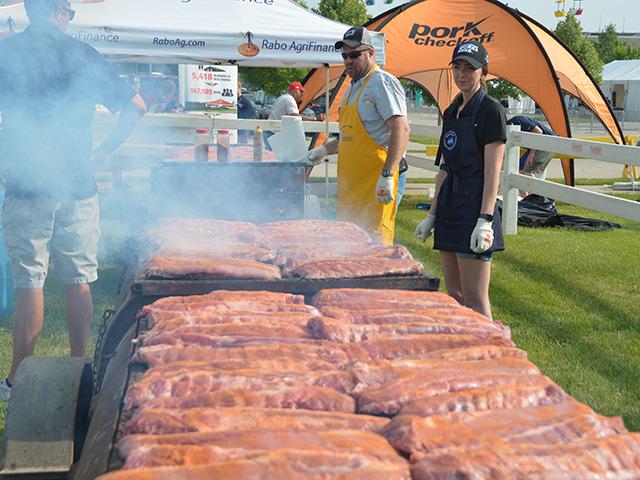NPPC Leaders Lay Out Policy Challenges
At World Pork Expo, Pork Producers Still Struggling With Ramifications of Prop 12 Ruling
DES MOINES (DTN) -- As hog producers and the pork industry gathered for the 35th World Pork Expo, leaders of the National Pork Producers Council were still trying to come to terms with the U.S. Supreme Court decision on California's Proposition 12.
Brian Humphreys, CEO of NPPC, said the court ruling in the May decision "will send shockwaves well beyond agriculture." He added, "the court has allowed a state to use its market power to impose policies on other states with higher costs and fewer choices."
Proposition 12 makes it a criminal offense and civil violation to sell whole pork meat in California unless the pig is born to a sow that was housed within 24 square feet of space and in conditions that allow a sow to turn around without touching an enclosure. Proposition 12 applies to any uncooked pork sold in the state, regardless of whether it was raised in California.
California makes up about 15% of the national pork market. NPPC staff said they are concerned because some foreign competitors have declared they can meet the state's housing standards. NPPC said domestic producers can't afford to lose access to California consumers.
"It's a large market and obviously we need that market," said Scott Hays, a pork producer from Missouri and president of NPPC.
Hays said the industry is trying to work with the California Department of Food and Agriculture (CDFA) about the rules and oversight. This week CDFA started holding webinars with producers as well as rules for food distributors.
"Everybody in the supply chain has had a hard time understanding how to become compliant with the law," Hays said.
The Supreme Court rulings were a split decision for pork producers because NPPC supported the court decision on EPA's waters of the U.S. rule that dialed back federal regulatory oversight for wetlands and other waters not directly connected to larger waterways.
P[L1] D[0x0] M[300x250] OOP[F] ADUNIT[] T[]
"It was such an overreach when it comes to the farms," Hays said, adding producers needed the assurance they could apply manure on the land and not face extensive regulation.
While hog prices on the CME have been in the upper $80s per cwt in recent weeks, that's down from $100-plus prices six months ago. Hays said producers are facing losses of close to $40 per head.
"The state of the industry is a challenge. No doubt about that," he said. "Producers are feeling a lot of pain. Some of the economists say it's been 25 years since we've had these kinds of losses and that's certainly recognized at NPPC."
Asked about the reasons for producer losses, Hays pointed to higher hog supplies as well as frozen pork. He also said farmers face higher input costs and it's taking about $200 to raise a hog that sells closer to $160 a head.
NPPC staff are also concerned about the union talks with ports along the West Coast. With Asian markets making up a large part of pork's $7.6 billion in exports, these ports including Long Beach, Los Angeles, Oakland and Seattle are seeing work slowed because of the labor contracts. Product is backing up along the supply chain.
"That's where most of our products are going out of," said Maria Zieba, vice president of international affairs for NPPC.
Shipping delays can translate into value lost, for instance, when an exporter is trying to ship fresh meat to Japan but delays in getting it there can cause the product arriving frozen instead, she said.
China remains a key market for U.S. pork with sales for the first three months of the year up 27% in value from a year ago, according to the U.S. Meat Export Federation. Presidential candidates who spoke last weekend at a GOP event at the fairgrounds talked about "decoupling" the U.S. economy from China. Asked about decoupling U.S. pork from China, Hays said, "China has been a good market for us. They're in and out of the market a little but they always take some product and the Chinese add value to every pig by taking products that Americans don't enjoy as much as the Chinese do."
On other topics, NPPC this week will also formally file its comments with USDA over its "product of the U.S." label. The proposed voluntary label would require livestock to be "born, raised, harvested and processed in the U.S." throughout its life to have that label. NPPC's board voted to oppose the rule, partially because trade agreements with Canada and Mexico have created an "integrated supply chain" in the three countries, Zieba said.
"We know voluntary labels become mandatory," she said.
Looking at the farm bill, the big focus for NPPC remains animal health and protecting the industry from foreign animal disease. Like cattle producers, NPPC talked about boosting the funding for the "three-legged stool" created in the 2018 farm bill, the National Animal Vaccine and Veterinary Countermeasures Bank (NAVVCB), the National Animal Disease Preparedness and Response Program (NADPRP), and the National Animal Health Laboratory Network (NAHLN).
The World Pork Expo continues through Friday.
Also see, "Pork Producers Consider Options After Supreme Court Setback on Proposition 12," https://www.dtnpf.com/…
"SCOTUS Ruling in Sackett May Require EPA to Withdraw Biden WOTUS Rule, https://www.dtnpf.com/…
Chris Clayton can be reached at Chris.Clayton@dtn.com
Follow him on Twitter @ChrisClaytonDTN
(c) Copyright 2023 DTN, LLC. All rights reserved.




